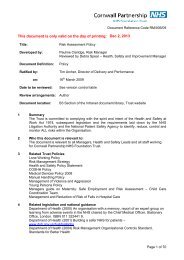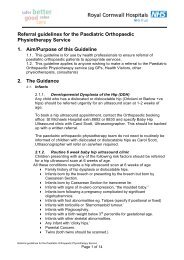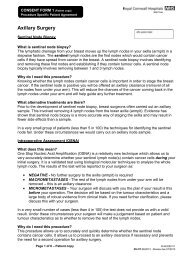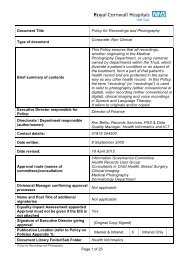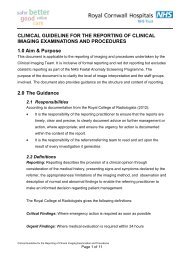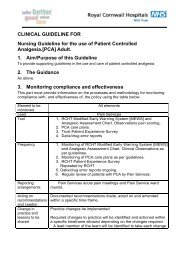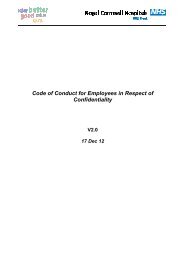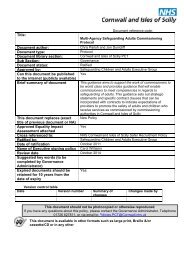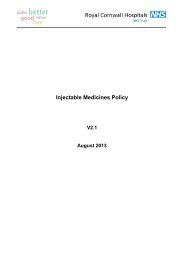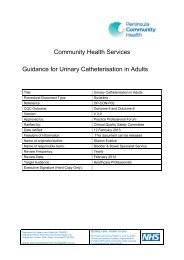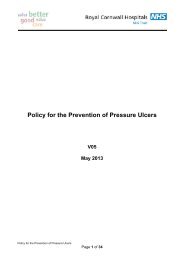Management of Extravasation of Cytotoxic Drugs in Children
Management of Extravasation of Cytotoxic Drugs in Children
Management of Extravasation of Cytotoxic Drugs in Children
You also want an ePaper? Increase the reach of your titles
YUMPU automatically turns print PDFs into web optimized ePapers that Google loves.
1. Purpose and Scope<br />
1.1 This document outl<strong>in</strong>es guidel<strong>in</strong>es for the rapid treatment <strong>of</strong> extravasation <strong>in</strong>juries<br />
<strong>in</strong> paediatric patients with<strong>in</strong> Royal Cornwall Hospital Trust, exclud<strong>in</strong>g neonates,<br />
for which there is a separate policy.<br />
1.2 It provides a guidel<strong>in</strong>e to assist practitioners <strong>in</strong> the care <strong>of</strong> patients who may have<br />
experienced an extravasation <strong>in</strong>jury.<br />
1.3 It will provide a basis for the nurs<strong>in</strong>g staff to recognise ways <strong>in</strong> which to help<br />
prevent extravasation and how to recognise when an extravasation has occurred.<br />
2. Def<strong>in</strong>ition<br />
2.1 <strong>Extravasation</strong> is the leakage or accidental <strong>in</strong>filtration <strong>of</strong> <strong>in</strong>travenous drugs <strong>in</strong>to the<br />
surround<strong>in</strong>g tissues from the ve<strong>in</strong>. This can lead to an immediate <strong>in</strong>flammatory<br />
pa<strong>in</strong>ful reaction and with some drugs may result <strong>in</strong> local tissue destruction<br />
(necrosis) and other complications.<br />
<br />
<br />
<br />
<br />
Neutrals do not cause ulceration and are unlikely to produce an acute<br />
reaction or progress to necrosis.<br />
Irritants are capable <strong>of</strong> caus<strong>in</strong>g <strong>in</strong>flammation and irritation. They rarely<br />
proceed to the breakdown <strong>of</strong> tissues. They do have the potential to cause<br />
ulceration, but only if a large amount has extravasated <strong>in</strong>to the tissue.<br />
Exfoliants are capable <strong>of</strong> caus<strong>in</strong>g <strong>in</strong>flammation and shedd<strong>in</strong>g <strong>of</strong> the sk<strong>in</strong>, but<br />
are less likely to cause tissue death. They can cause pa<strong>in</strong><br />
Vesicants are drugs that have the potential to cause blister<strong>in</strong>g and ulceration,<br />
which when left untreated can lead to tissue damage and necrosis.<br />
2.2 It is recognised that prevention <strong>of</strong> extravasation is <strong>of</strong> importance and particularly<br />
when adm<strong>in</strong>ister<strong>in</strong>g vesicants or irritants the precautions should be taken to<br />
m<strong>in</strong>imise the risk <strong>of</strong> extravasation, see appendix 4.<br />
2.3 It is accepted that there are also other contribut<strong>in</strong>g factors that can affect each<br />
<strong>in</strong>dividual patient’s risk <strong>of</strong> extravasation.<br />
2.4 There are many different drugs that can equally be as destructive <strong>in</strong> the damage<br />
that they can cause if extravasation occurs, the ma<strong>in</strong> bulk <strong>of</strong> this document<br />
relates to cytotoxic chemotherapy, but the procedure outl<strong>in</strong>ed can be used for all<br />
vesicant drugs. Please note that there is a separate guidel<strong>in</strong>e for the<br />
extravasation <strong>of</strong> non-cytotoxic drugs <strong>in</strong> the neonate.<br />
2.5 Cancer drugs have been grouped <strong>in</strong>to 5 categories based on their potential to<br />
cause tissue damage, see appendix 1.<br />
<strong>Management</strong> <strong>of</strong> <strong>Extravasation</strong> <strong>of</strong> <strong>Cytotoxic</strong> <strong>Drugs</strong> <strong>in</strong> <strong>Children</strong><br />
Ratified: Review: 6



